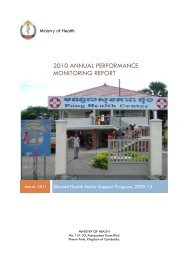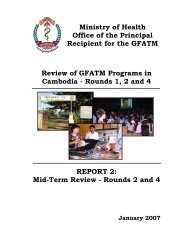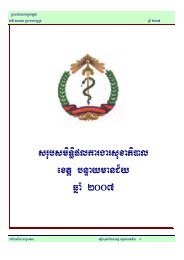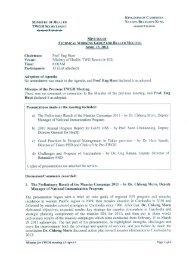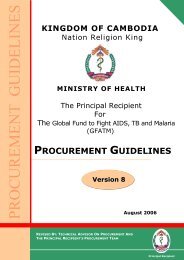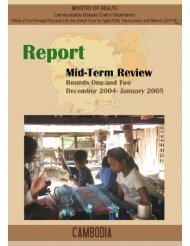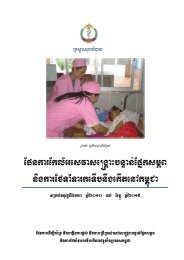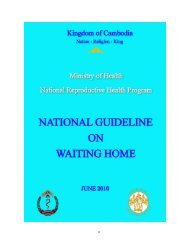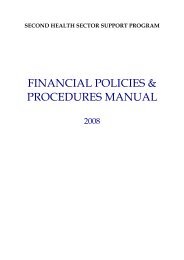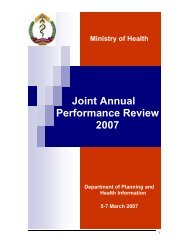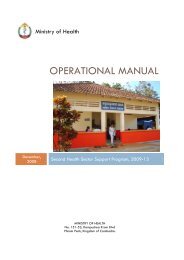Financial Manual Health Equity Fund - Ministry of Health
Financial Manual Health Equity Fund - Ministry of Health
Financial Manual Health Equity Fund - Ministry of Health
You also want an ePaper? Increase the reach of your titles
YUMPU automatically turns print PDFs into web optimized ePapers that Google loves.
Kingdom <strong>of</strong> Cambodia<br />
Nation – Religion – King<br />
<strong>Ministry</strong> <strong>of</strong> <strong>Health</strong><br />
<strong>Financial</strong> <strong>Manual</strong><br />
For<br />
<strong>Health</strong> <strong>Equity</strong> <strong>Fund</strong><br />
Department <strong>of</strong> Planning and <strong>Health</strong> Information
1 Introduction ................................................................................................... 3<br />
2 Contractual arrangements.............................................................................. 3<br />
3 Expenditures categories and chart <strong>of</strong> accounts ............................................. 5<br />
3.1 Direct Costs.............................................................................................................................. 5<br />
3.1.1 Medical benefits.......................................................................................................................................... 5<br />
3.1.2 Food for patients ......................................................................................................................................... 6<br />
3.1.3 Transport for patients .................................................................................................................................. 6<br />
3.1.4 Other items.................................................................................................................................................. 6<br />
3.2 Administrative costs................................................................................................................. 7<br />
3.2.1 Human resources......................................................................................................................................... 7<br />
3.2.2 Technical assistance .................................................................................................................................... 7<br />
3.3 Chart <strong>of</strong> accounts ..................................................................................................................... 8<br />
3.4 Administrative Steps................................................................................................................ 8<br />
4 <strong>Financial</strong> Management and Control............................................................11<br />
4.1 Budget.................................................................................................................................... 11<br />
4.2 Accounting procedures .......................................................................................................... 12<br />
4.3 Advances................................................................................................................................ 13<br />
4.3.1 In General:................................................................................................................................................. 13<br />
4.3.2 Salary Advance ......................................................................................................................................... 13<br />
4.3.3 Travel Advance ......................................................................................................................................... 13<br />
4.3.4 HEFI’s advance to HEFO ......................................................................................................................... 13<br />
4.4 Payments and Transfers ......................................................................................................... 14<br />
4.4.1 Planning .................................................................................................................................................... 14<br />
4.4.2 Management.............................................................................................................................................. 14<br />
4.4.3 Receipts..................................................................................................................................................... 14<br />
4.4.4 Pro<strong>of</strong> <strong>of</strong> Payment....................................................................................................................................... 14<br />
4.4.5 Use <strong>of</strong> banking system .............................................................................................................................. 15<br />
4.4.6 Pay roll services ........................................................................................................................................ 15<br />
4.4.7 Reconciliation requirements...................................................................................................................... 15<br />
5 Asset Management and Control ..................................................................15<br />
6 Purchasing Management and Control .........................................................16<br />
7 Audit............................................................................................................16
1 Introduction<br />
The purpose <strong>of</strong> this manual is to set standards for financial management practices<br />
for all the schemes mentioned below. All other aspects related to the functioning <strong>of</strong><br />
HEF and SUBO are defined in the “Guidelines for Implementation <strong>of</strong> <strong>Health</strong> <strong>Equity</strong><br />
<strong>Fund</strong>s and Government Subsidy schemes” referred to in this manual in several<br />
instances.<br />
<br />
<br />
<br />
<br />
<br />
A <strong>Health</strong> <strong>Equity</strong> <strong>Fund</strong> (HEF) is any mechanism or fund that is used by a<br />
3 rd party payer to purchase health care for poor people from a health care<br />
provider. The fund can also be used to pay for other associated costs such as<br />
transport and food.<br />
A Subsidy (SUB) is government funding meant to be used to benefit poor<br />
people by financially compensating health care providers for the provision <strong>of</strong><br />
appropriate health care to poor patients without charging any fees.<br />
A <strong>Health</strong> <strong>Equity</strong> <strong>Fund</strong> Operator (HEFO) is an agency (NGO or civil society<br />
organization) at operational district level, that either independently or under<br />
responsibility <strong>of</strong> a HEFI, purchases health care for poor people from a health<br />
care provider. The HEFO must be independent from the health care provider.<br />
A HEFO commonly uses HEF as the resource for its activities, while a HEFO<br />
can also receive and use SUB to strengthen its purchasing power.<br />
A <strong>Health</strong> <strong>Equity</strong> <strong>Fund</strong> Implementer (HEFI) is an agency that represents<br />
and manages more than one HEFO under its responsibility.<br />
A Subsidy operator (SUBO) is any Public <strong>Health</strong> Authority that receives<br />
and manages Subsidy (SUB)<br />
Any deviation from the prescriptions <strong>of</strong> this manual must be in agreement with the<br />
<strong>Ministry</strong> <strong>of</strong> <strong>Health</strong> and clearly indicated in the contract or Memorandums <strong>of</strong><br />
Understanding between the HEFI and the <strong>Ministry</strong> <strong>of</strong> <strong>Health</strong>. This includes<br />
provisions for a transitional period for agencies already implementing HEF, to<br />
update their financial and management procedures to comply with this manual.<br />
A HEFO which does not operate under the responsibility <strong>of</strong> an HEFI should still<br />
comply with this manual in all cases.<br />
HEFI and HEFOs are advised to divide tasks and responsibilities, preferably through<br />
a transparent and explicit internal contract. However, this internal contract does not<br />
remove responsibility <strong>of</strong> both HEFI and HEFO to comply with this manual.<br />
2 Contractual arrangements<br />
Institutional arrangements for <strong>Health</strong> <strong>Equity</strong> <strong>Fund</strong>s are described in the "Guidelines<br />
for Implementation <strong>of</strong> <strong>Health</strong> <strong>Equity</strong> <strong>Fund</strong>s and Government Subsidy Schemes".<br />
Page 3 <strong>of</strong> 17
Contracts or Memorandums <strong>of</strong> Understanding must be agreed upon and signed<br />
between stakeholders are as follows:<br />
• Internal contracts or MOU between the <strong>Ministry</strong> <strong>of</strong> <strong>Health</strong> and SUBOs<br />
(National Hospitals)<br />
• Internal contracts between the ODOs acting as SUBOs and designated health<br />
service providers (RH and HC) in the area<br />
• Contract or MOU between the <strong>Ministry</strong> <strong>of</strong> <strong>Health</strong> and HEFIs<br />
• Contract or MOU between the <strong>Ministry</strong> <strong>of</strong> <strong>Health</strong> and HEFOs, in case there is<br />
no HEFI<br />
• Contract or MOU between a HEFI and one or several HEFO<br />
• Contract or MOU between HEFO and health service providers (hospitals and<br />
health centers) in their area <strong>of</strong> coverage<br />
The above contracts or MOUs will specify:<br />
• Start and end date <strong>of</strong> the agreement (recommended 1 year agreement),<br />
• Signatory parties,<br />
• Extent <strong>of</strong> services to be covered by the contract agreement,<br />
• Deliverables,<br />
• Reporting requirements,<br />
• Monitoring and evaluation framework,<br />
• Total and disaggregated budget,<br />
• Disbursement methods and schedules,<br />
• Provision for breach <strong>of</strong> contract by all parties, sanctions and termination.<br />
Internal contracts between the <strong>Ministry</strong> <strong>of</strong> <strong>Health</strong> and SUBOs will specifically apply<br />
provisions <strong>of</strong> Prakas 809.<br />
Contracts or MOUs must be signed and in effect before implementing parties start<br />
operating. Contracts or MOUs will generally cover one year <strong>of</strong> operation. They can<br />
be extended with appropriate amendments, without procurement.<br />
All payments to <strong>Health</strong> Service Providers are based on a written contract with the<br />
health service provider. The contract must specify the services and payment levels<br />
as well as the payment method that have been agreed upon. The contract should<br />
cover an agreed time period. For an overview <strong>of</strong> provider payment methods, see<br />
HEF Implementation Guideline.<br />
Contract or MOUs must include as annexes samples <strong>of</strong> all working documents as<br />
follows:<br />
• Summary <strong>of</strong> Treatment Form<br />
• Daily or weekly financial reports template for health service providers (report<br />
to HEFOs or SUBOs)<br />
• Food and Transport Allowance Receipt vouchers (to be signed by HEF<br />
beneficiaries)<br />
• Daily or weekly financial reports template for access facilitators based in the<br />
health facilities<br />
• <strong>Financial</strong> report template for HEFO (to submit to HEFI)<br />
• Quarterly reports template for HEFI (to submit to the MOH)<br />
• Quarterly reports templates for SUBOs (to submit to the MOH)<br />
Page 4 <strong>of</strong> 17
• Disbursement vouchers (for all individual disbursements)<br />
• Statement <strong>of</strong> expenditures<br />
• Bank transfer sheets<br />
• Petty cash book<br />
• Cash count sheet<br />
• Advance request form<br />
• Advance register<br />
• Reconciliation <strong>of</strong> amount advanced<br />
• Budget status report<br />
Contracts or MOUs must also include the following annexes specific to each HEF:<br />
• the pre-identification methodologies to be applied and in case <strong>of</strong> postidentification,<br />
the detailed wealth ranking tool<br />
• Detailed lists or description <strong>of</strong> price calculation for the different types <strong>of</strong><br />
direct benefits<br />
• the yearly financial planning<br />
3 Expenditures categories and chart <strong>of</strong> accounts<br />
Two main categories <strong>of</strong> expenditures will be distinguished:<br />
♦ Direct Costs<br />
♦ Administration Costs<br />
3.1 Direct Costs<br />
Direct costs relate to those expenditures which provide a direct benefit to HEF<br />
beneficiaries. These benefits are:<br />
Medical benefits provided by the <strong>Health</strong> Service Providers<br />
Food for patient and caretaker<br />
Transport costs<br />
Other, including funeral grants<br />
Full description <strong>of</strong> each <strong>of</strong> the above categories is provided in the HEF and<br />
Government Subsidy Implementation Guidelines.<br />
Beneficiaries <strong>of</strong> HEF and SUBO services are pre- or post-identified. Full description<br />
<strong>of</strong> the identification processes is provided in the HEF and Government Subsidy<br />
Implementation Guidelines.<br />
3.1.1 Medical benefits<br />
Medical benefits are provided by public health services and cover MPA and CPA. In<br />
case <strong>of</strong> SUBO operating at National Hospitals, the medical benefit covers full range<br />
<strong>of</strong> services provided at the National Hospitals.<br />
The full range <strong>of</strong> medical benefits covered by HEF is described in the following<br />
contracts or MOUs:<br />
Between MOH and HEFI and MOH and SUBO<br />
Page 5 <strong>of</strong> 17
Between HEFI and HEFO<br />
Between HEFO and health service providers in the area covered.<br />
Each contract must specify the following, at the minimum:<br />
3.1.2 Food for patients<br />
The medical benefit package provided to HEF beneficiaries,<br />
The agreed fee schedule for reimbursement <strong>of</strong> facilities: fee<br />
schedules for medical benefit package must follow the user fee<br />
schedule <strong>of</strong> the facility and are fixed for the period <strong>of</strong> the contract.<br />
The mechanism <strong>of</strong> reimbursement to facilities,<br />
Effective start and end date <strong>of</strong> the contract (it is recommended<br />
that the contracts last for one year)<br />
Caretakers <strong>of</strong> HEF patients are provided a food allowance during<br />
hospitalization. Food allowance may be cash or in-kind and<br />
completes the food allowance provided by the facility.<br />
Full description <strong>of</strong> the food allowance, including amount <strong>of</strong> food<br />
allowance, is provided in the following contracts or MOUs:<br />
Between MOH and HEFI<br />
Between HEFI and HEFO<br />
3.1.3 Transport for patients<br />
3.1.4 Other items<br />
HEF Patients are reimbursed for their transport costs to and from the<br />
facility. Estimation <strong>of</strong> transport grant should be based on the<br />
geography <strong>of</strong> HEF location: a lump sum amount should be defined per<br />
kilometer depending on the road situation (good road, bad road or by<br />
boat).<br />
Full description <strong>of</strong> the transport allowance is provided in the following<br />
contracts or MOUs:<br />
Between MOH and HEFI<br />
Between HEFI and HEFO<br />
Transport by ambulance will be reimbursed on price schedules agreed<br />
with the public institutions and fixed for the contract period<br />
Funeral grant is paid to the HEF Patient's family if HEF Patient dies.<br />
Full description <strong>of</strong> the funeral grant is provided in the following<br />
contracts or MOUs:<br />
Between MOH and HEFI<br />
Between HEFI and HEFO<br />
Page 6 <strong>of</strong> 17
3.2 Administrative costs<br />
3.2.1 Human resources<br />
Salaries and allowances<br />
Employee benefits<br />
Employee recruitment costs<br />
3.2.2 Technical assistance<br />
Short term<br />
Long term<br />
3.2.2.1 Training<br />
Workshops<br />
Meetings<br />
Training publications<br />
3.2.2.2 Equipment<br />
Office equipment<br />
Office furniture<br />
Vehicle<br />
Motorcycle<br />
Maintenance and repair<br />
3.2.2.3 Planning and Administration<br />
Office supplies<br />
Travel and transport<br />
Legal advice<br />
Translation<br />
Accounting<br />
Auditing<br />
Bank charges<br />
3.2.2.4 Monitoring and Evaluation<br />
Data collection and data analysis<br />
Field visits<br />
Research<br />
3.2.2.5 Promotion, community networking and communication<br />
IEC material<br />
Advertising<br />
Media event<br />
Community promotion and networking<br />
3.2.2.6 Pre- and Post-identification<br />
Salary and allowances<br />
Technical assistance<br />
Training<br />
Equipment<br />
Planning and administration<br />
Monitoring and evaluation<br />
Overheads<br />
3.2.2.7 Overheads<br />
Rent<br />
Page 7 <strong>of</strong> 17
Utilities<br />
Telephone, email, internet<br />
Insurance<br />
Security<br />
Cleaning<br />
Electricity, Water<br />
Fuel<br />
Miscellaneous<br />
3.3 Chart <strong>of</strong> accounts<br />
HEFI, HEFO and SUBO must use the Chart <strong>of</strong> Accounts provided by the MOH in<br />
annex <strong>of</strong> this manual. The Chart <strong>of</strong> Accounts document should be available at HEFI<br />
and each HEFO <strong>of</strong>fice.<br />
The HEFI will assign a 2-digit code number to each HEFO.<br />
Under each HEFO account code, a number <strong>of</strong> line items are defined. Each line item<br />
will bear the HEFO account code followed by a 3-digit charge code, as described in<br />
the chart <strong>of</strong> account in annex.<br />
3.4 Administrative Steps<br />
Allocation <strong>of</strong> HEF budget<br />
Allocation <strong>of</strong> HEF budget to HEFI and SUBO is defined in the contract / MOU<br />
between the MOH and HEFI or the MOH and SUBO<br />
Group1: Agencies operating subsidies for the poor from Government<br />
budget (National Hospitals)<br />
These agencies are defined in the HEF implementation guidelines as SUBO/Group 1<br />
They are reimbursed for medical benefits provided to HEF patients on a monthly<br />
basis after submission <strong>of</strong> their claims to the MOH / DBF<br />
• A Summary <strong>of</strong> Treatment Form (STF) is completed for each HEF patient<br />
treated in the National Hospital. ). STF should be signed by the attending<br />
medical staff and the HEF patient.<br />
• All STFs are compiled in a monthly financial report from the SUBO to<br />
MOH/DBF. Monthly financial report includes a monthly statement <strong>of</strong><br />
expenditures. Original STFs must be attached to the monthly financial report.<br />
The report must be signed the SUBO manager at the national hospital and by<br />
the hospital director.<br />
• DBF reimburses the SUBO after verification <strong>of</strong> the monthly financial report<br />
• SUBO submit a quarterly report including financial report to MOH/DPHI<br />
Page 8 <strong>of</strong> 17
• Quarterly reports to DPHI and monthly reports to DBF must be consistent<br />
and will be reconciled by the MOH<br />
• MOH/DPHI will perform regular monitoring <strong>of</strong> Group 1 SUBO. Monitoring<br />
procedures are defined in the Guidelines <strong>of</strong> Implementation <strong>of</strong> HEF and<br />
Subsidies for the Poor<br />
Group2: Agencies operating subsidies for the poor from Government<br />
budget (ODO)<br />
These agencies are defined in the HEF implementation guidelines as SUBO/Group 2<br />
They are reimbursed for medical benefits provided to HEF patients on a monthly<br />
basis after submission <strong>of</strong> their claims to Provincial Treasury.<br />
• A Summary <strong>of</strong> Treatment Form (STF) is completed for each HEF patient<br />
treated at the contracted health service provider (RH or HC). STF should be<br />
signed by the attending medical staff and the HEF patient.<br />
• All STFs are compiled in a weekly financial report at facility by subsidy<br />
manager at the facility. Weekly financial reports are submitted to the<br />
SUBO/ODO. Original <strong>of</strong> STFs must be attached to the weekly financial report.<br />
The report must be signed by the subsidy manager at the facility and by the<br />
hospital director or health center chief.<br />
• SUBO/ODO prepares a monthly financial report which will serve as a claim<br />
for reimbursement to the Provincial Treasury. The claim must be co-signed<br />
by OD Director and PHD director. Monthly financial reports should include a<br />
monthly statement <strong>of</strong> expenditures and bank and cash reconciliation.<br />
• Provincial Treasury reimburses SUBO/ODO after verification <strong>of</strong> the financial<br />
report<br />
• SUBO/ODO prepares a quarterly report to MOH/DPHI, with copy to PHD<br />
• Quarterly reports and financial reports must be consistent and will be<br />
reconciled at the PHD.<br />
♦ MOH/DPHI will perform regular monitoring <strong>of</strong> Group 2 SUBO. Monitoring<br />
procedures are defined in the Guidelines <strong>of</strong> Implementation <strong>of</strong> HEF and<br />
Subsidies for the Poor<br />
Group3 and 4: HEFI/HEFOs<br />
These agencies are defined in the HEF implementation guidelines as Groups3 and 4.<br />
Page 9 <strong>of</strong> 17
They will receive advance payments for their operations on a quarterly basis and<br />
will submit financial reports for reconciliation prior to further installments.<br />
• HEFO will prepare a detailed budget for period <strong>of</strong> the contract, broken down<br />
by quarters. A detailed budget for the first quarter <strong>of</strong> operation will be<br />
annexed. The budget will be submitted to the HEFI. HEFI will disburse in<br />
advance the first installment for one quarter <strong>of</strong> operation after verification <strong>of</strong><br />
the budget.<br />
• A Summary <strong>of</strong> Treatment Form is completed for each HEF patient treated at<br />
the contracted health service provider (RH or HC). STF must be signed by<br />
the attending medical staff, the HEF patient and the Access facilitator<br />
• HEFO will deliver food allowances to caretakers <strong>of</strong> hospitalized HEF patients<br />
on a daily basis. Advance food allowances can be given for Saturdays,<br />
Sundays and public holidays. HEF Patient caretakers will sign a food<br />
allowance receipt.<br />
• HEFO will pay Transport allowances to HEF patient or caretaker upon<br />
admission and discharge from the hospital: travel from home to hospital will<br />
be reimbursed upon admission and travel back from hospital to home will be<br />
paid in advance upon discharge. HEF Patient or caretaker will sign a<br />
Transport allowance receipt.<br />
• In case a patient dies, the HEFO will pay a lump sum amount to the Patient's<br />
caretaker for funeral. Caretaker will sign a Funeral Grant receipt.<br />
• HEFO will compile STFs, Food and Transport Allowance receipts, funeral<br />
grants receipts in a financial report. The financial report is signed by the<br />
HEFO and the Hospital director or the <strong>Health</strong> Center chief. All original STFs<br />
and receipts will be attached to the report.<br />
• HEFO will reimburse the hospital for the medical costs after verification <strong>of</strong> the<br />
facility report.<br />
• HEFO will prepare a monthly financial report and send it to HEFI. The report<br />
will cover direct and administrative costs, and will include monthly statement<br />
<strong>of</strong> expenditures as well as bank and cash reconciliation. All original receipts<br />
and documents will be attached. An electronic copy <strong>of</strong> the HEFO data will be<br />
submitted together with the report.<br />
• HEFI will check HEFO reports and investigate discrepancies between<br />
electronic data, reports and supporting documentation. This will be done<br />
through supervision <strong>of</strong> HEFO and monitoring <strong>of</strong> HEFO and facilities.<br />
• HEFO and HEFI will reconcile all financial reports and HEFO budget on a<br />
quarterly basis. Subsequent quarterly installments <strong>of</strong> the budget will be<br />
disbursed to HEFO after reconciliation.<br />
• HEFI will prepare a quarterly report based on HEFO monthly reports and<br />
quarterly reconciliations and send it to the MOH.<br />
• MOH/DPHI will perform regular monitoring <strong>of</strong> HEFI and HEFO, as well as<br />
contracted health facilities. Monitoring procedures are described in the<br />
Guidelines for Implementation <strong>of</strong> HEF and Subsidies for the poor.<br />
Filing system:<br />
All original documents supporting a financial report should be kept at HEFI and<br />
SUBO.<br />
Page 10 <strong>of</strong> 17
It must be kept for at least 2 years for purpose <strong>of</strong> auditing and<br />
evaluation.<br />
Documents should be filed by chronological order.<br />
Separate files should be kept for inpatients and outpatients.<br />
Filing should be by Hospital and by <strong>Health</strong> Center in each OD.<br />
All Summary <strong>of</strong> Treatment forms should be filed in a binder. A separate<br />
binder should be kept for each facility. These are sent to HEFI or SUBO<br />
for control.<br />
HEFO must keep a copy <strong>of</strong> all files before sending to HEFI.<br />
The contract between HEFI and MOH will specify the destination <strong>of</strong> these<br />
documents after the end <strong>of</strong> the HEFI contract and the requirement <strong>of</strong> a end <strong>of</strong><br />
contract audit.<br />
4 <strong>Financial</strong> Management and Control<br />
The HEFI or SUBO are accountable towards <strong>Ministry</strong> <strong>of</strong> <strong>Health</strong> for the<br />
financial management <strong>of</strong> the <strong>Health</strong> <strong>Equity</strong> <strong>Fund</strong> resources. Monitoring and<br />
supervision from MOH to HEFI and SUBO is described in the Guidelines for<br />
Implementation <strong>of</strong> HEF and Subsidies for the Poor<br />
SUBO responsibilities are clearly stated in the internal contract between MOH<br />
and the SUBO.<br />
Respective HEFI and HEFO responsibilities are clearly stated in the contract<br />
or MOU between MOH and HEFI and between HEFI and HEFO.<br />
HEFI responsibility includes controlling the HEFO budget and expenditures.<br />
The HEFO operates and administers its revenue and expenditures, based on<br />
delegated responsibility but closely supervised by the HEFI. HEFO are<br />
accountable to HEFI for the financial management <strong>of</strong> <strong>Health</strong> <strong>Equity</strong> <strong>Fund</strong><br />
resources delegated to them.<br />
SUBOs should follow requirements <strong>of</strong> MOH/DBF <strong>Financial</strong> Management.<br />
4.1 Budget<br />
HEFO budget is the result <strong>of</strong> a planning process informed by reliable data<br />
on the expected expenditures. The budget will serve as a basis for<br />
detailed implementation plan that will be established before HEFO starts<br />
operating.<br />
For more complex settings, it is highly recommended to develop budgets<br />
for each major activity in the project and to delegate implementation<br />
responsibility. This responsibility does not replace oversight by the HEFO<br />
financial manager.<br />
Budget reviews can take place at regular intervals, for example 6 monthly<br />
or yearly.<br />
Budget plans will be used to make quarterly advance disbursements to<br />
the HEFO.<br />
HEFO will keep a monthly work-plan based on the master budget plan.<br />
Page 11 <strong>of</strong> 17
Expenditures will be recorded in monthly Statement <strong>of</strong> expenditures.<br />
A monthly progress expenditure register will be maintained, comparing<br />
expenditure<br />
4.2 Accounting procedures<br />
At HEFO, HEFI and SUBOs:<br />
All disbursements from cash or bank accounts will require a disbursement voucher.<br />
For cash disbursements, signed cash receipts will be annexed to disbursement<br />
vouchers.<br />
For bank disbursements:<br />
bank transfer sheets will be annexed to disbursement vouchers if<br />
disbursement was made through bank transfer<br />
copies <strong>of</strong> checks will be annexed to disbursement vouchers if<br />
disbursement was made through checks<br />
All disbursement vouchers will clearly identify:<br />
the type <strong>of</strong> expenditure,<br />
whether the expenditure is an advance payment<br />
the recipient (individual, agency or company receiving the funds)<br />
the budget line/ chart <strong>of</strong> account expenditure code<br />
the date <strong>of</strong> disbursement<br />
The period during which the funds can be used<br />
Others supporting documents may be annexed to disbursement vouchers.<br />
Each disbursement voucher holds a unique serial number and is signed by an<br />
authorized signatory.<br />
All disbursement vouchers will be recorded in a monthly statement <strong>of</strong> expenditures,<br />
under the correct chart <strong>of</strong> account expenditure code. Disbursement voucher number<br />
should be reported in each accounting entry.<br />
Accounts will be closed once a month and entries in the statement <strong>of</strong> expenditures<br />
will be checked and reconciled with original disbursement vouchers and supporting<br />
documents.<br />
Bank and cash reconciliations must be made at the same time.<br />
Statement <strong>of</strong> expenditures and bank and cash reconciliation must be attached to all<br />
monthly financial reports.<br />
Budget status will be updated based on statement <strong>of</strong> expenditures and a budget<br />
status report will be issued. This will allow to update the workplan for the next<br />
month.<br />
Page 12 <strong>of</strong> 17
4.3 Advances<br />
SUBOs normally do not receive advances. In case advances are granted to SUBOs,<br />
the advance procedure must comply with MOH/DBF <strong>Financial</strong> <strong>Manual</strong>.<br />
4.3.1 In General:<br />
All advances should be made through disbursement vouchers and recorded in the<br />
accounts under the correct budget line.<br />
Separate records <strong>of</strong> the amounts advanced to each employee must be kept.<br />
Expense reports must be made for each advance payment and reconciled with<br />
disbursement voucher, using an Advance Reconciliation Form.<br />
4.3.2 Salary Advance<br />
No salary advances shall be given by HEFI nor by HEFO.<br />
4.3.3 Travel Advance<br />
HEFI and HEFO can make a Travel Advance to their respective staff members.<br />
Advance Requests should be filled and signed.<br />
The request should be approved and signed by authorized signatory.<br />
Requests will be made at least 2 days prior to travel.<br />
In emergency cases, payments can be made immediately.<br />
If travel advances are not cleared within one week <strong>of</strong> return from trip, the amount<br />
must be deducted from staff salary in the next payroll schedule.<br />
Standard Travel expenses such as per diems, accommodation, subsistance<br />
allowance will be specified in the MOU or contract.<br />
For counterparts traveling with the HEFI or HEFI staff per diem rates will follow<br />
sub-decree 10 or it’s replacement.<br />
4.3.4 HEFI’s advance to HEFO<br />
4.3.4.1 Initial advance from HEFI to HEFO:<br />
HEFI will disburse advance quarterly payment based on HEFO quarterly budget.<br />
Disbursement will be made through bank transfer or by check.<br />
Page 13 <strong>of</strong> 17
4.3.4.2 Further advances from HEFI to HEFO:<br />
HEFI and HEFO accounts must be reconciled as described above (chapter 3.4 and<br />
4.4) before subsequent advances payments can be made.<br />
4.4 Payments and Transfers<br />
Petty cash is meant for small purchases that cannot be done by check. As much as<br />
possible the <strong>Health</strong> finance/ administrator should use checks when purchasing<br />
goods or services for the project. If this is not possible, purchases <strong>of</strong> less than US$<br />
100 value can be done using petty cash.<br />
4.4.1 Planning<br />
Each HEFO should establish a quarterly projection <strong>of</strong> cash expenditures. Monthly<br />
cash flow plans are prepared by HEFO manager and communicated to HEFI.<br />
4.4.2 Management<br />
Cash transactions will be recorded in disbursement voucher, with attached<br />
supporting document.<br />
A cash book is maintained allowing cash reconciliation at the end <strong>of</strong> the month.<br />
The contract or MoU will specify the minimum and maximum amounts that the<br />
Petty Cash can contain.<br />
Cash is replenished when necessary and after reconciliation.<br />
4.4.3 Receipts<br />
Dated and signed receipts must be created to justify each <strong>of</strong> the following<br />
expenses:<br />
- all direct benefit expenses related to food and transport received by poor<br />
patients;<br />
- all indirect benefit expenses<br />
The receiver or signatory can be either the patient or the patient’s caretaker.<br />
In case the caretaker receives the money on behalf <strong>of</strong> the patient, the receipt must<br />
mention the exact relationship <strong>of</strong> the caretaker to the patient as well as the name <strong>of</strong><br />
actual patient who has benefited from treatment..<br />
4.4.4 Pro<strong>of</strong> <strong>of</strong> Payment<br />
Only the following types <strong>of</strong> documents are recognized as pro<strong>of</strong> <strong>of</strong> payment:<br />
original bank statement for direct benefit payments to health service<br />
providers<br />
Page 14 <strong>of</strong> 17
eceipt signed and dated by an identifiable receiver <strong>of</strong> other payments;<br />
payment slip signed and dated by an identifiable payer <strong>of</strong> small amounts<br />
4.4.5 Use <strong>of</strong> banking system<br />
For payments and transfers related to <strong>Health</strong> <strong>Equity</strong> <strong>Fund</strong> agencies and <strong>Health</strong><br />
Service Providers, the <strong>Ministry</strong> <strong>of</strong> <strong>Health</strong> requires that these are effected through<br />
bank transfers, as much as possible using the same bank.<br />
All payments from HEFI to HEFO and from HEFO to health facilities (hospitals and<br />
health centers) should be done through bank transfers.<br />
The same applies for payments from Provincial Treasury to SUBOs and SUBOs to<br />
health facilities.<br />
The <strong>Ministry</strong> <strong>of</strong> <strong>Health</strong> facilitates the opening <strong>of</strong> bank accounts in the name <strong>of</strong> public<br />
health facilities or Subsidy operators for the purpose <strong>of</strong> handling <strong>Health</strong> <strong>Equity</strong> <strong>Fund</strong><br />
money or Subsidy. Every bank account must have at least two signatories, who can<br />
sign individually: one is the Director <strong>of</strong> the Public <strong>Health</strong> Facility and one is the Vice-<br />
Director <strong>of</strong> the concerned Public <strong>Health</strong> Facility in charge <strong>of</strong> Finance/Admin.<br />
Day-to-day responsibility for the management <strong>of</strong> the local bank account rests with<br />
the <strong>Health</strong> Finance and Administrator Office/ Project Manager or with the executive<br />
director. Reporting on transactions from the account as well as monthly balance is<br />
updated monthly in the field <strong>of</strong>fice (provinces).<br />
4.4.6 Pay roll services<br />
The salary payments begin on the effective day <strong>of</strong> appointment and continue<br />
through the effective day <strong>of</strong> separation. Salary payments will be made in Riels or in<br />
US dollars on or about the 25th day <strong>of</strong> the month.<br />
4.4.7 Reconciliation requirements<br />
The tasks <strong>of</strong> closing monthly accounts at the HEFO and HEFI are the following:<br />
a- Completed advance reconciliation form<br />
b- Cash book in US dollars and in KH Riels, signed cash counts<br />
c- Bank statement<br />
d- Bank reconciliation<br />
e- Budget status report<br />
5 Asset Management and Control<br />
SUBO, HEFO and HEFI will keep a complete and accurate list <strong>of</strong> its own Inventory.<br />
Inventory list should include all non-consumable items with a purchasing value that<br />
exceeds USD 50 per item purchased by HEFO. Each item should receive an<br />
Inventory Number. The inventory list should include the inventory number, date <strong>of</strong><br />
purchase, price and serial number <strong>of</strong> the item if available. This list is updated<br />
monthly and signed by the manager.<br />
Page 15 <strong>of</strong> 17
A copy <strong>of</strong> the signed HEFO inventory lists is sent to HEFI.<br />
For equipment items purchased by HEFI for HEFOs:<br />
HEFI keeps a list, disaggregated by HEFO. This list is updated every month, printed<br />
out, attached to the copy <strong>of</strong> the HEFO’s own inventory, and signed by the HEFI<br />
Manager.<br />
The inventory number and date <strong>of</strong> purchase should be taped on the equipment<br />
item, on a spot where it is not likely to wear <strong>of</strong>f rapidly and protected by a piece <strong>of</strong><br />
transparent scotch tape.<br />
All inventory lists should be available for supervision and monitoring and<br />
comparison with availability <strong>of</strong> equipment items on site should show no discrepancy.<br />
6 Purchasing Management and Control<br />
As much as possible, the tasks <strong>of</strong> purchasing, paying and accounting should be kept<br />
separate at both HEFI and HEFO.<br />
In practice in the HEFO, most expenditure is related to items that are not<br />
negotiated on a daily basis, namely all direct and indirect benefits as well as HEFO<br />
staff salaries, rents and utilities. In HEFO, the requirement to split purchasing from<br />
paying and accounting is therefore only relevant for unexpected small purchases<br />
from the petty cash, all <strong>of</strong> which are booked under the administration costs.<br />
In HEFI, in particular if the HEFI purchases for several HEFO’s, respect <strong>of</strong><br />
procurement rules is important. Procurement rules should follow either HSSP or<br />
MOH procurement rules depending on sources <strong>of</strong> funding.<br />
The different contracts or MOU will define the ownership <strong>of</strong> equipment/vehicles<br />
procured in the context <strong>of</strong> the HEF. They will also define responsibilities such as the<br />
maintenance and insurance <strong>of</strong> the procured items.<br />
7 Audit<br />
External Audit: A financial and operational audit should be part <strong>of</strong> the continuous<br />
(on quarterly IFRs) and year end audit <strong>of</strong> HSSP II as a whole. The selection <strong>of</strong> audit<br />
firm and TOR should be recognized by the <strong>Ministry</strong> <strong>of</strong> <strong>Health</strong> and acceptable to the<br />
DPs.<br />
Internal Audit: Department <strong>of</strong> Internal Audit will conduct regular financial audit to<br />
all SUBOs<br />
HEFI will be responsible for financial control <strong>of</strong> the HEFOs.<br />
Page 16 <strong>of</strong> 17
Annexes<br />
- Summary <strong>of</strong> Treatment Form<br />
- Daily or weekly financial report template for <strong>Health</strong> Providers<br />
- Daily or Weekly financial report for Access Facilitators<br />
- Food, Transport and Funeral allowance receipts<br />
- <strong>Financial</strong> report template for HEFO<br />
- <strong>Financial</strong> report template for SUBO<br />
- Quarterly report template for HEFI and SUBO<br />
- Budget control statement<br />
- Disbursement vouchers<br />
- Disbursement form SUBO<br />
- Statement <strong>of</strong> expenditures<br />
- Bank transfer sheet<br />
- Cash book<br />
- Cash count sheet<br />
- Advance request form<br />
- Advance register<br />
- Advance reconciliation form<br />
- Budget status report<br />
- Chart <strong>of</strong> accounts<br />
Page 17 <strong>of</strong> 17



